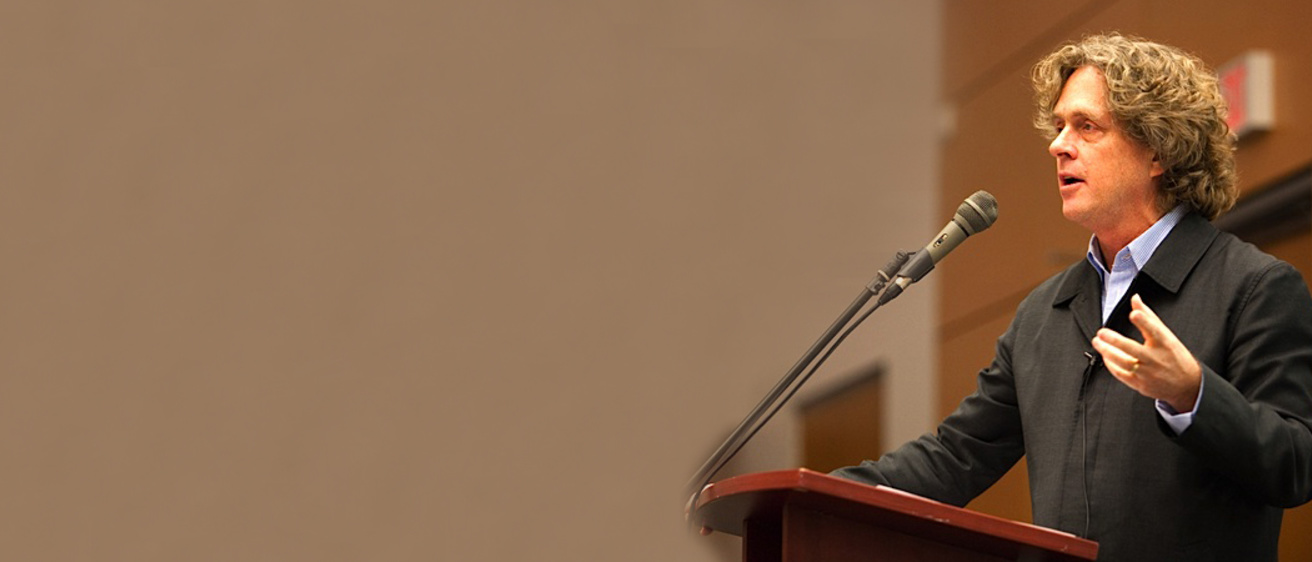On April 28, we invite you to join Christopher Newfield (University of California, Santa Barbara) as he asks, “What Are the Humanities For—in the 21st Century?” One of the country’s most energetic analysts of higher education funding, Newfield has such diverse interests and expertise that his talk may range from literature to economics and corporate culture to the roots of American education and current race relations, all filtered through the interpretive lens of the humanities. His presentation from 4:00 to 5:30 at the Iowa City Public Library both winds up the Obermann Center’s Designing the Future series and raises powerful questions about our own future.
From Emerson to Solar Power
Newfield’s curriculum vitae reads like an unlikely and yet amazing mash-up of at least three different academics’ work. He has written a book about Emerson and taught on transcendentalism. He has edited a series of books and journal issues about higher education and writes routinely in the public sphere about educational policy, tuition, student debt, graduate rates, and the growing inequality between rich and poor colleges. He also publishes articles such as “Open Source Nano for the ‘Developing’ World,” and “Does Solar Energy Need a New Innovation Model? The Case of Germany.” Not to mention classes he has taught on “Detective Fiction” and “Noir California.”
A public intellectual and polymath, Newfield has multiple intellectual homes at University of California, Santa Barbara, where he is professor of English and American Studies, as well as a member of the Center for Nanotechnology in Society’s Cross-IRG Integrative Project group on solar energy. In addition to his work at UCSB, he has served on system-wide committees for the University of California on budget, technology transfer, and industry-university cooperative research. Newfield regularly dances between all of these topics in his Huffington Post columns and on his blog, Remaking the University.
Critical University Studies Founder
One of the founders of the Critical University Studies field, Newfield has published several books related to the current state of higher education, including Unmaking the Public University: The Forty Year Assault on the Middle Class (Harvard, 2008), Ivy and Industry: Business and the Making of the American University, 1880-1980 (Duke, 2003), and the forthcoming Lowered Education: What to Do About Our Downsized Future.
In talks and articles, Newfield challenges the so-called crisis in the humanities and argues that within universities, the humanities fields need to budget and build their research infrastructure; outside universities, scholars in the humanities can offer clear, vivid arguments and examples of the roles the humanities and cultural leaders play in creating community-enhancing, non-commercial forms of innovation.
Newfield’s talk is from 4:00 to 5:30 pm on Monday, April 28, in Meeting Room A of the Iowa City Public Library, with a reception to follow at Prairie Lights Books's Times Club. Newfield’s visit is sponsored by the Obermann Center for Advanced Studies. The Public Policy Center and POROI (Project on the Rhetoric of Inquiry) are co-sponsors. For questions about his lecture, please contact Erin Hackathorn at erin-hackathorn@uiowa.edu or call 319.335.4034.
Higher Ed in California Featured in Film Scene Screening
The week after Newfield's visit, the conversation about the future of higher education continues. On May 4 at noon, FilmScene will present the documentary At Berkeley, directed by Frederick Wiseman. The Bijou Film Forum, the College of Education, and the Obermann Center will co-sponsor a panel discussion after the film featuring University of Iowa faculty members Christopher Morphew, Executive Associate Dean for Research and Innovation in the College of Education, and William Ming Liu, professor of Psychological & Quantitative Foundations in the College of Education and Frank Durham and Meenakshi Gigi Durham, professors in the Department of Journalism & Mass Communication in the College of Liberal Arts and Sciences.
